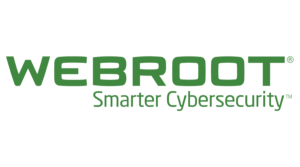
How Do I Use Webroot?
It runs automatically in the background and requires 0 effort from employees and business owners. It is fully managed on our side to make sure all definitions are up to date, all scans are being performed, and all systems are free from malware.
How Much Will It Slow Down My Computer?
When a scan isn’t running, Webroot uses about 20-25MB of RAM. On a standard 8GB RAM laptop, this equates to about a 0.3% usage
How Often Do I Need to Scan My System?
Never – Scanning happens in real time when new files are added.
Why Does It Say "Please contact your network administrator to access the user interface of SecureAnywhere" When I Click on the Icon?
Malware in general gets on a computer by an unsuspecting user overriding protection and warnings. This way, users cannot willingly turn off protection and potentially harm the computer or company.
What Happens If I Get Infected?
If malware gets on the system, it will create a ticket for us to investigate. We can remove infections from our remote portal, but cannot get into your computer without your prior consent.
How Will I Know If It Is Working?
There will be a green W logo in your taskbar. When you hover over, it will say that you are Protected
How Can I Uninstall?
Rush will need to remove it from our portal and then it will be able to get uninstalled through normal add/remove programs. This stops malware from being able to deactivate and bypass the security.
I Already Have Antivirus, Can I Keep That?
Having two antivirus’ is detrimental to a computer. It is an extra layer that will slow down the computer, without adding additional security. In fact, having two antivirus programs can negate each other and leave a computer more vulnerable than if only one existed. The other one needs to be removed.
Will It Work on Mac?
Yes
What Is Endpoint Protection?
Endpoint protection, or endpoint security, is a general term that describes cybersecurity services for network endpoints, like laptops, desktops, smartphones, tablets, servers, and virtual environments. These services may include antivirus and antimalware, web filtering, and more. Endpoint protection helps businesses keep critical systems, intellectual property, customer data, employees, and guests safe from ransomware, phishing, malware, and other cyberattacks.
Why Do Businesses Need Endpoint Protection?
Criminals are constantly developing new ways to attack networks, take advantage of employee trust, and steal data. Smaller businesses may think they’re not a target, but that couldn’t be further from the truth. In fact, small businesses with 100 employees or fewer now face the same risk of attack as a 20,000-employee enterprise.*
No matter their size, businesses need reliable endpoint security that can stop modern attacks. And since most companies are subject to some form of compliance and privacy regulations, protection for endpoints is 100% necessary to help businesses avoid hefty fines and damage to their reputation due to a security breach.